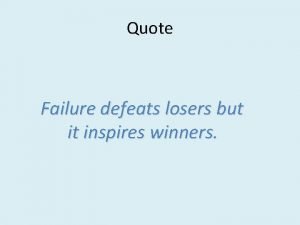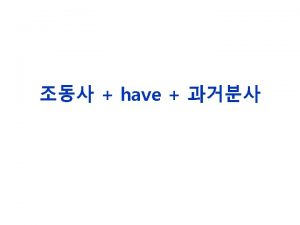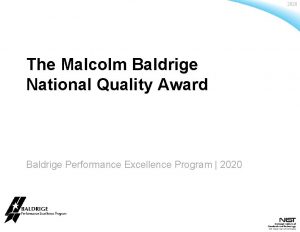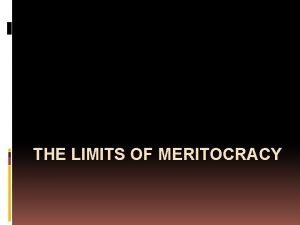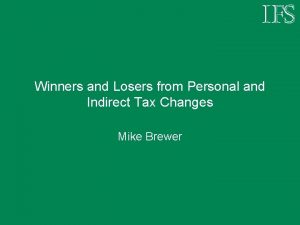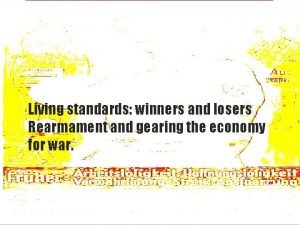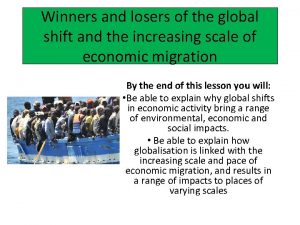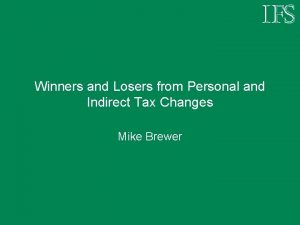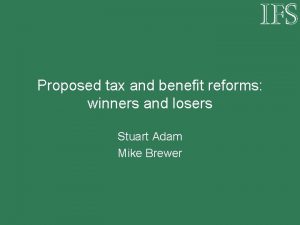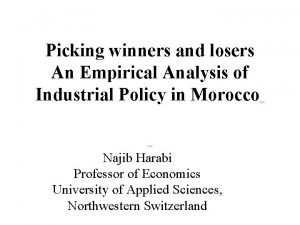Meritocracy gone wrong The winners and losers of













- Slides: 13

Meritocracy gone wrong: The “winners” and “losers” of learning in European education systems Dr Daniel Briggs Professor of Criminology Universidad Europea

Whats happening now �Europe wants to be competitive globally in knowledge economies alongside other international powerhouses. �Therefore = wants to improve human capital by securing young peoples’ entry to the job market having provided them good-quality education therefore enhancing their “employability”. �Policy aims include ensuring 40% of all young people have completed higher education by 2020 and that those entering and graduating reflect the diversity of Europe’s populations.

But… �Increased economic instability, ‘risk’, potential ecological catastrophe, high unemployment, and increasing social inequality sharpened by welfare reduction and a criminalisation of the ‘underclass’. �Increased prevalence of social unrest, civil war and political and financial instability = lack of quality politics which works for everyday people. �Globalizacion and consumer and technological advancement = dissolution of certainty, gross profiteering and major downsizing at expense of middle to lower class brackets. �“Commitments” to eradicate inequality in education and improve social inclusion yet millions of young Europeans can’t access and millions more drop out of formal educational opportunities.

More “buts” and some “ands” �When labour markets shrink, and more people wait to enter them, neoliberal ideologies around “personal responsibility” pervade = aggressive neoliberalism. �Translated in all forms of social, cultural and commercial life = Pressure on the individual’s capacity to rise above their socio-economic circumstances, develop “personal resilience” in the belief that with “hard work” comes “individual achievement” and “anything is possible”. �“What work” programmes heavily designed around empowerment, feelgood, soundgood and dogood factors = often enough for policymakers and other important people so say they are doing enough.

Subjective incorporation of the structural �This installs in people an individual competitiveness and sense of responsibilisation for personal success. �People now feel like they should achieve as part of what is expected of them as much as they expect as themselves, and when achievement stutters in a culture of social distinction, failure is felt twice as hard. �So in a competitive society, which determines who does well and who doesn’t - by means of their individual gumption – there can only be “winners” and “losers”.

The neoliberalisation of learning: How education is affected by these changes �Education systems + business ethics = “improved efficiency and quality”. �Governmental education funding mechanisms have diminished across Europe and instead enabling a reliance on corporate strategies and business plans as a means of survival. �Pressure on league table position, recruit ‘good students’ who can get ‘good results’ which can assist with the reputation, funding and therefore the continued functioning of the educational institution.

The school (The Academy) �Introduced in 2000 to offer high-class education and raise educational standards = in particular in disadvantaged areas around “poor-performing”. �But those schools closing �Not all the students from those very areas getting places in the Academies �Selective admissions practices, do not teach their local community and ‘exclude poor quality students’ as a means to improve their performance, and hence, move up the league tables.

The university

The “winners”: Relative success is relative economically �Have more wealth and a higher class position, tend to come through the education system, get the best results, and qualify for the world’s most prestigious universities. �Consequently, make the most money and get the most secure forms of work in the most-stable industries – if not, they have the cultural capital to jump across.

The “losers” who bought the dream sold to them: Conveyor-belt education

The “losers” and their pacified dreams �“Losers” lower class cohort from middle to lower bracket. �Most go full cycle in conveyor-belt education = out of formal statistics, “doing something” and occupying their time. �Some respite in low-grade, low wage jobs = expanding and exploitative service sector. �Lack of “success”, frustration and sense of indignation quashed by commercial distraction mechamisms = psychological safety net of reality TV, Facebook, going out and spending money they don’t have, etc = Pacified dreams.

“The losers”: Bust in Monte Carlo �Generally born into blocked circumstances, living mostly in politically-disenfranchised and socially-neglected urban spaces / fleeing war torn countries. �Quickly exhaust already limited educational avenues to them (if available in first place) = locked out of formal labour markets resulting in survival in informal economies or arrive into economies which only exploit them. �Distant dreamers as the odds are massively stacked against them to anything other than what they come to know. Not impossible but severely unlikely.

A forecast: Unsettled turning stormy Problems with an education system treats human capital investment as the route to “success” and that this awaits every young person who can engage their own meritocratic initiative. 2. Educational institutions as private enterprises do few favours to people from the margins and don’t really improve the real-life chances of those in the middle to lower bracket or further down. 3. Long-term consequences of sidelining low-achievers and/or already living in conditions of social and spatial exclusion = criminalization of those groups and the social costs thereafter burdonise other social institutions (Police, Prisons, Health, etc). 1.
 Lateral thinking riddle
Lateral thinking riddle Failure defeats losers but inspires winners
Failure defeats losers but inspires winners Advantages of functionalism
Advantages of functionalism Plastic surgery gone wrong
Plastic surgery gone wrong Must 의문문
Must 의문문 Plexr
Plexr Botox injection dubai
Botox injection dubai Iambic pentameter
Iambic pentameter Craap ap seminar
Craap ap seminar Losers mc maine
Losers mc maine Snoozers are in fact losers ap seminar
Snoozers are in fact losers ap seminar Winners circle training
Winners circle training Baldrige award winners 2020
Baldrige award winners 2020 X factor 2015 bulgaria
X factor 2015 bulgaria

